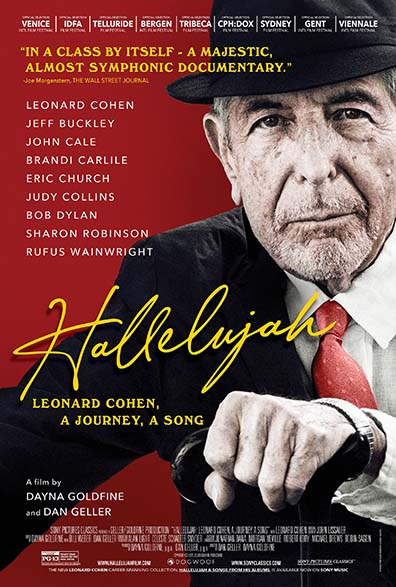Léirmheas Scannáin: Hallelujah: Leonard Cohen. A Journey, A Song
Bono said 'Hallelujah' was the best song ever. Maybe he's right!
Singer-songwriter Leonard Cohen wrote 'Hallelujah' over a period of five years. But the song didn't gain much recognition at first, like Cohen himself - that wouldn't happen for them for a long time. The story of the song and its composer are intertwined, and co-directors Daniel Geller and Dayna Goldfine use that strong connection to create a documentary.
Late Starter
Leonard Cohen was an unusual rock star. This Canadian poet and novelist was 40 years old when Judy Collins (who made Cohen's song 'Suzanne' popular) advised him, saying: "You can't stay hidden any more; you have to sing in public.” Cohen could not sing or play music at the time. But after a while, he became very successful as a musician.
Rejection
Cohen was around fifty years old in 1984, when he finished his song 'Hallelujah'. He collaborated with producer John Lissauer and backing singer Jennifer Warnes to prepare a new album, entitled 'Various Positions'. He sent it to Columbia Records, and Columbia president Walter Yetnikoff asked Cohen to meet with him. Yetnikoff said to him: "Look, Leonard, we know you're great, but we don't know if you are any good!" Yetnikoff refused to release the album. It is noteworthy that there were three great songs on that album - 'Hallelujah', 'Dance Me to the End of Love' and 'Be Your Will'!
John Cale, Glen Hansart agus Jeff Buckley
'Hallelujah' was originally a long song. But when he was working on a Cohen tribute album called 'I'm your Fan', the famous musician John Cale made comprehensive edits to the song before singing it on the album. But there was still an ingredient missing – in the name of Jeff Buckley!
Jeff Buckley was an Irish-American (son of the great musician Tim Buckley, a friend of Cohen), and he started working as a roadie for Glen Hansart and 'The Commitments', when they were on tour in the United States in 1991. Hansart encouraged him to play and sing his own music in the Sin-é cafe in Manhattan. By the way, an Irishman named Shane Doyle opened Sin-É cafe in 1989.
Although the great musician Jeff Buckley released a version of 'Hallelujah' (based on John Cale's arrangement) in 1994 on his album 'Grace', 'Hallelujah' did not reach the top of the charts until 1998. Undoubtedly, Buckley’s accidental death in 1997 brought the song to public attention. When they heard it, they then realized how beautiful 'Hallelujah' was, and especially Buckley's arrangement.
Comeback
Cohen spent 5 years, from 1994 to 1999, in a Zen monastery in Los Angeles. Cohen was regularly plagued by depression, and sought refuge. Eventually, he realized that his cure was not to be had in the monastery and left it. He then released a couple of less successful albums - one in 2001 (Ten New Songs) and another in 2004 (Dear Heather).
But when his manager, Kelley Lynch, stole most of his money, he decided to make a comeback at the age of 73. He put a band together, and they went on tour in 2007. Tickets for their concert were sold out quickly, and they had to add other dates to their schedule. Cohen continued to work like that until 2013, and he was more successful than ever.
From Strength to Strength
The hit film 'Shrek' (2001) had two very popular versions of 'Hallelujah': John Cale's version in the film, and Rufus Wainwright's version on the film's soundtrack.
In 2004, KD Lang released a version of Hallelujah on her album 'Hymns of the 49th Parallel' and sang it at the opening ceremony of the 2010 Winter Olympics.
Alexandra Burke's arrangement, winner of the fifth series of 'The X Factor', went to the top of the charts at Christmas 2008. Then, almost every singer in every talent show around the world started singing 'Hallelujah'.
"We spoke to the busker you see in our film outside the underground train station in Manhattan," said director Goldfine. “And she told us that if she's having a hard time getting an audience and there's no money coming in, she starts playing 'Hallelujah'. She says it works every time.”
What would you say now, Walter Yetnikoff?






